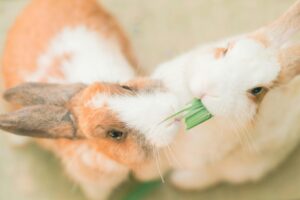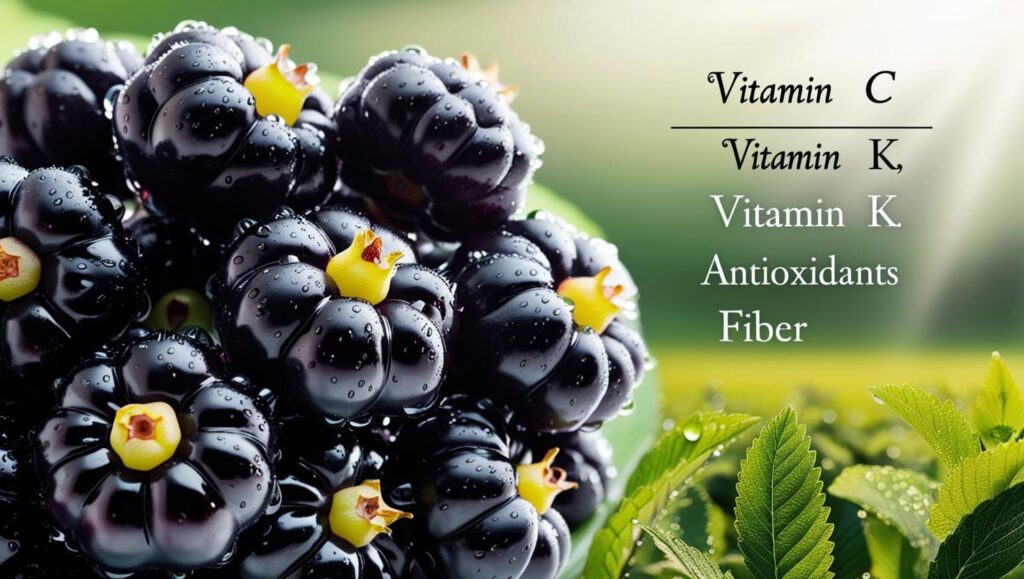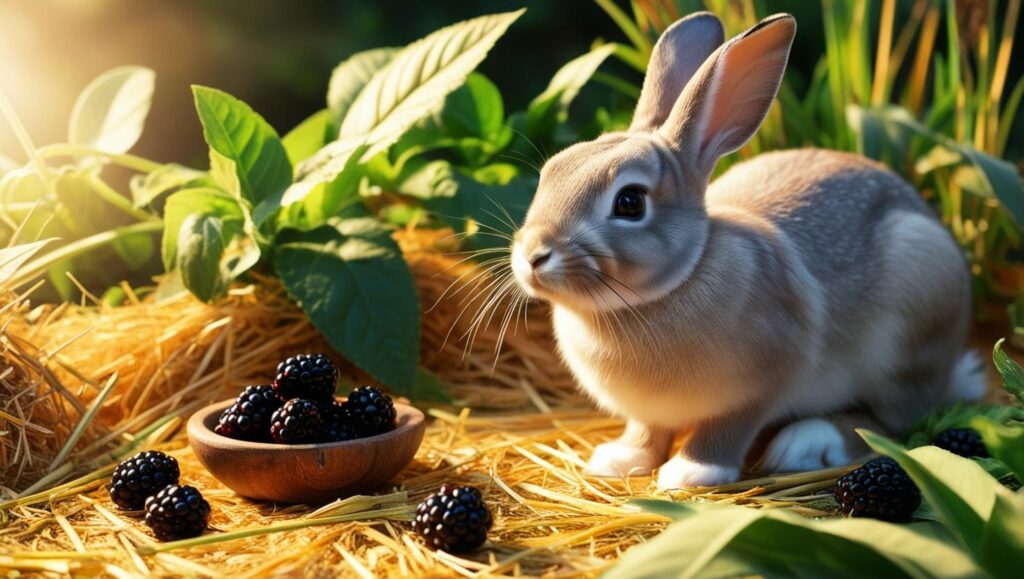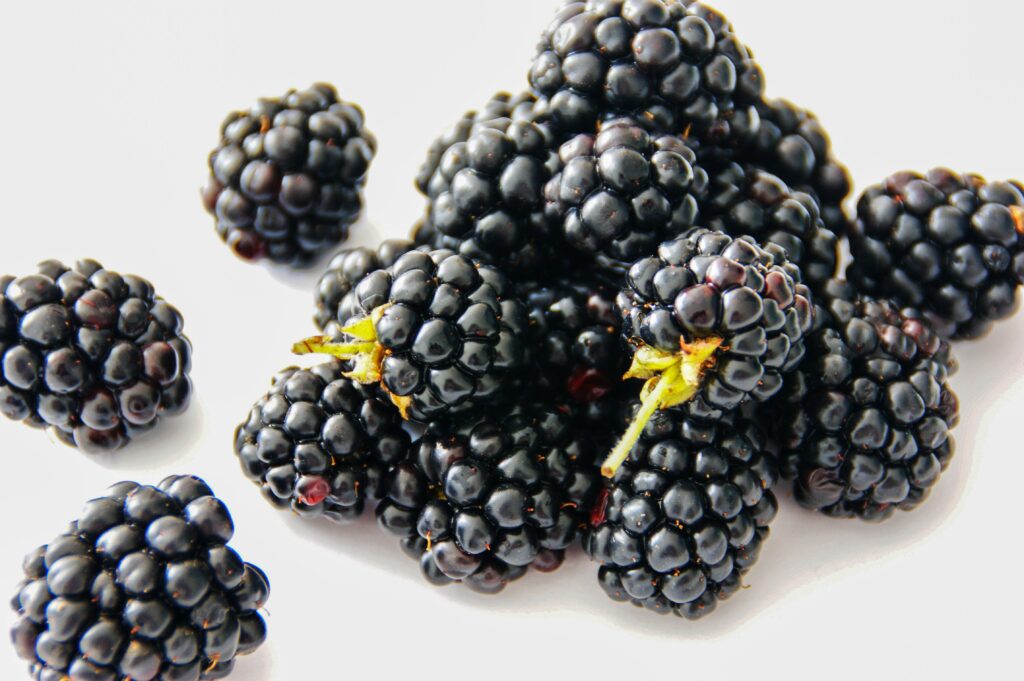Can Rabbits Eat Blackberries?
Diet: What to Feed Your Rabbit
Rabbits are cute, social animals with diets high in fiber, fresh vegetables, and hay. Since they are herbivores, their digestive system is meant to digest and obtain energy from plant-based foods, hence why it’s important to offer them a healthy and nutrient-dense diet.

The appropriate diet promotes a rabbit’s long-term health, assists in maintaining a healthy weight, and minimizes the chance of common conditions such as obesity, dental illness, and digestive problems.
A rabbit’s diet should mainly be good quality hay (Timothy or Meadow hay) with fresh veg and a small quantity of fresh fruit as treats. Just remember to mix up their diet with respect to their special nutrition needs;
Because of this, one fruit that many pet owners might wonder about when giving their rabbits is blackberries. Not only are these small, juicy fruits delicious, they are also a source of useful nutrients. However the question is, can rabbits eat blackberries? So let’s take a look at whether or not this fruity delight is safe for your bunny and how to properly incorporate it into their diet.
Nutritional Benefits of Blackberries for Rabbits
Blackberries are not just tasty but highly nutritious and can therefore serve as a tempting treat for rabbits. Rich in vitamins, antioxidants and more, blackberries can be a healthy addition to your diet in moderation.

Vitamins and Minerals:
Blackberries are a rich source of Vitamin C, a critical nutrient for rabbits. Rabbits can make their own Vitamin C but it’s in small amounts and it’s definitely a good supplementary addition, especially for younger females and during times of stress.
Blackberries are also rich in Vitamin K, which plays a role in blood coagulation, and Vitamin A, which is important for healthy eyesight and immune system function.
Antioxidants:
Blackberries are high in antioxidants, including anthocyanins and flavonoids, which help protect the body’s cells from oxidative stress.
These antioxidants contribute to its immune system and may have anti-inflammatory effects which positively influences the health of your rabbit.
High in Fiber:
Rabbits need a high-fiber diet for optimal digestion. Though blackberries, like hay or leafy greens, are not high in fiber (in fact, they have a modest amount), they can help keep the gut healthy and prevent firing.
Low in fat:
Blackberries are also low in fat which makes them a great fruit for rabbits that need to stay trim or are prone to obesity. While not high in calories, a bunny would benefit from having some, as long as you only offer a correct portion of the food.
While Blackberry contains certain beneficial nutritional components, it has to be remembered that blackberries, like all fruits, must be fed to rabbits only as a treat and not as a staple food.
Can Rabbits Have Blackberries?
The blackberry is a type of berry that is safe for rabbits to eat only when introduced to their diets in the correct quantities. Blackberries are not toxic to rabbits, but there are some important considerations to keep in mind to help you keep your rabbit healthy when feeding them blackberry fruit.
Safe Fruits for Rabbits
Fruits: In addition to hay and vegetables, rabbits can eat small amounts of fruit. Fruits contain a lot of natural sugars, and when eaten in large quantitiesthey can be hard for rabbits to digest. It can cause digestive problems like diarrhea, obesity, and more severe health issues like gastrointestinal stasis when rabbits fed excess sugar fruits.
Rabbits tend to be able to eat one of the safer fruits:blackberries. Unlike citric-acid-rich fruits or lots of other artificial chemicals, blackberries have natural sugars that are easier on a rabbit’s stomach when fed in the right doses. We’ve even gone as far to argue that some fruit be included in the rabbit diet.
Fruit should never replace hay or leafy greens, which should make up most of their daily food intake.
Toxic Foods for Rabbits
Rabbits can eat blackberries safely, but there are plenty of other foods that are toxic to rabbits and are never acceptable to feed your bunny.
Some types of fruits should be avoided, such as grapes, raisins and citrus fruits, like oranges or lemons, as these can be harmful to your pet. We could get into some details here, but I would recommend doing your research about what foods are safe before offering anything new to your rabbit.
Introducing Blackberries to Your Rabbits Diet the Right Way

Whichever new food you introduce tobunny’s diet, it should be done repeatedly. Rabbits have very fragile digestive systems, and sudden additions or changes to their diet can cause digestive upset or potential serious problems. Follow these steps for successfully introducing blackberries to your rabbit:
Offer a Tiny Taste:
Start with a small piece of blackberry when you first offer it to your rabbit. Which lets you see any potential reactions. Begin with a portion no bigger than a single berry. Rabbits have delicate digestive systems, and a tiny portion makes sure they won’t get overrun by the fruit’s natural sugars or fiber.
Watch Your Bunny:
Be sure to watch your bunny after presenting the blackberry and look for any signs of gastrointestinal distress, including diarrhea, intestinal bloat or loss of appetite.
Should there be any negative symptoms noticed, quit feeding blackberries and contact your vet. Well-formed and well-formed stools are the norm in healthy rabbits; if they change, this could mean the fruit is not agreeing with them.
Make sure to wash the blackberries you feed your rabbit to remove any dirt, pesticides, or chemicals that may be there. To avoid these risks, it’s best if your rabbit eats organic blackberries.
Tip:
Blackberries should be considered an occasional treat for your rabbit rather than a staple food. Once or twice a week is a good frequency to offer blackberries. It should be mostly hay-based, with small portions of veggies and fruit.
Serve With Other Safe Veggies:
If you’ll be serving blackberries, combine them with some leafy greens to create a satisfying snack. When you combine your fruit with a high-fiber vegetable like romaine lettuce or dandelion greens, you not only add nutritional benefit but also make sure your rabbit is getting the essential fiber.
Things not to do when providing blackberries for rabbits
While blackberries are safe for rabbits in moderation, there are a few potential pitfalls to look out for when giving these to your pet:

Overfeeding Fruit
Fruit should be treated as a treat and not a daily part of your rabbits diet. Too much fruit can result in sugar overload in your rabbit’s diet that can lead to obesity, obesity-associated health problems, and digestive problems. Excessive fruit can also lead to a sugar high then crash, which can leave your bunny pooped or cranky.
Sugar Content
Not even the natural sugar found in blackberries is healthy for your bunny, because too much sugar will not be good for your rabbit at all. Excessive sugar consumption can result in obesity, dental disease and gastrointestinal issue. Always measure and control fruit portions so you don’t over-feed sugar to your bunny.
Digestive Health
Rabbits are especially sensitive to any disruption in their digestive health. Overdoing fruit or new foods too quickly can cause diarrhea or bloating. Do it carefully, and pay attention to your rabbit’s reaction to the new treat.
Unwashed Fruit
Always wash blackberries well before feeding them to your rabbit to avoid pets being exposed to chemicals. If not properly removed, pesticides and other residues can harm your bunny’s health.
Final Thoughts:
Treating Your Rabbit to Blackberries from Time to Time is Okay
Overall, however, while blackberries can be a safe and healthy treat for your rabbit, they are also full of beneficial nutrients, including vitamins, antioxidants and fiber. In moderation, and as part of a balanced diet, but like all fruits.
The bulk of your rabbit’s diet should always be hay and fresh vegetables, while fruit should be given sparingly as the occasional reward. By adding blackberries to your rabbit’s diet gradually, monitoring for any adverse reactions, and limiting how often you serve fruit, you can help keep your bunny healthy, happy, and Quincy Jones-ready!
As with all diet changes, please talk to your veterinarian if you’re unsure about adding a new food to your rabbit’s diet. But as long as you take care and follow these instructions, you can give your rabbit small amounts of blackberries safely while still keeping their diet balanced and high-fiber, which is key.
FAQ:
Feeding Blackberries to Rabbits
1. Can rabbits eat blackberries?
Yes, rabbits can eat blackberries in moderation. Blackberries are safe and offer quite a few nutritional benefits, including vitamins, antioxidants, and fiber, but should only be given as an occasional treat.
2. What are the benefits of blackberries for rabbits?
Blackberries are rich in:
- Vitamin content: vitamin C, K, and A, excellent for immune response, blood clotting, and vision. Both antioxidants and acids protect the rabbit’s cells from oxidative stress and may well act as an anti-inflammatory. Low fat: ideal in case of tendency to obesity. It contains fiber and supports gut health. 3. How often can I give blackberries to my rabbit?
Blackberries are an occasional treat and shall be given only 1-2 times a week. They must not take the place of hay, which makes up the majority of the diet.
4. How much blackberry can I feed my rabbit?
Give them just one small berry initially to see if they tolerate it well. Increase the portion, but no more than 1-2 small berries at a time.
5. Can blackberry feeding pose risks to rabbits?
Yes, there are possible risks:
Digestive upset: Diarrhea or bloating due to sudden introduction or overfeeding.
Sugar content: Too much sugar given could result in obesity or dental problems.
Unwashed fruit: Chemical pesticides and residues can jeopardize your rabbit’s health. Always wash blackberries well before feeding.
6. What should I do if my rabbit shows any signs of being in distress from eating blackberries?
When any symptoms such as diarrhea, bloating, and loss of appetite become noticed, stop immediately and consult a veterinarian.
7. Can rabbits eat blackberry leaves or stems?
Yes, blackberry leaves are safe and can provide additional fiber for rabbits. On the other hand, avoid feeding the stems as they are thorny and may hurt your rabbit’s mouth.
8. Should I give my rabbit organic blackberries?
Yes, organic blackberries are best recommended since they do not have harmful pesticides or chemicals. In cases where you cannot get organic blackberries, make sure that they are washed well.
9. Can blackberries be a replacement for hay or vegetables in a rabbit’s diet?
No, blackberries are a treat and should never replace the main components of a rabbit’s diet, such as hay at 80–90% of intake and fresh vegetables.
10. Are there other fruits that are safe to feed my rabbit?
Yes, rabbits can have fruits like apples (without seeds), strawberries, and blueberries in small amounts. Fruits high in sugar or acidic, like grapes, citrus fruits, or raisins, should be avoided.
11. How do I introduce blackberries into my rabbit’s diet?
- Give a small piece of blackberry.
- Observe your rabbit for 24 hours for any signs of digestive issues.
- If tolerated, continue to feed in moderation.
**12. Can baby rabbits eat blackberries?
It is better to avoid feeding fruits to bunnies who are under 12 weeks of age. Their systems are more sensitive and may not take the sugars well.
13. How to give blackberries to a rabbit?
Wash them clean and serve plain. You can mix them with leafy greens such as romaine lettuce or dandelion greens for a healthy snack.
14. Are there foods rabbits should never eat?
yes, toxic foods for rabbits include:
- Grapes and raisins
- Citrus fruits-oranges, lemons, etc.
- Processed foods, chocolate, or anything sugary or salty
**15. Should I consult a vet before adding new foods like blackberries in my rabbit’s diet?
Yes, always consult your veterinarian if you are not sure of adding new foods or if your rabbit has special dietary needs.
Yuns Legdm is a passionate advocate for pet care and the founder of this website, dedicated to providing valuable information for fellow pet lovers and veterinary professionals worldwide. With a deep love for animals, Yuns created this platform to connect passionate pet owners with expert insights from veterinarians around the globe.
This website grows with you—the passionate pet owners and veterinary experts—creating a trusted space where knowledge, experience, and love for animals come together. Whether you’re seeking advice on pet health, nutrition, or general well-being, this platform is here to support you on your journey of responsible and loving pet care.





